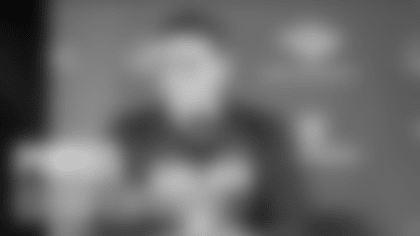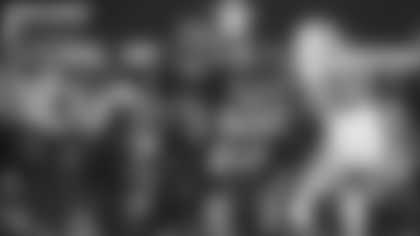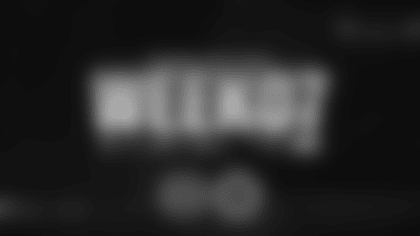Washington Commanders head coach Ron Rivera addressed the media after practice on Aug. 2. Here is a full transcript of the press conference.
On how he measures the growth of the team overall:
"Well, I think the biggest thing as far as the defense is concerned, being where they are, it's about taking what you've done the last few years and growing. Adding the little nuances that you couldn't get initially because you're still learning. I think we're at that point now where, especially in talking with [Defensive Coordinator] Jack [Del Rio], the different things that they're doing, the little nuances to the defense that can be solutions for some of the things that we struggled with last year. Offensively it could be from everything from getting into formations, that's just probably one of the more important things. And understanding motions and shifts as to why we do those things. Then it is understanding the route combinations. Why am I running this particular route in this particular concept? Those are all the details that these guys are learning in the meetings. Now take that and put it on the field and then retain it. You know what I'm saying? Because there's a lot. One thing [Assistant Head Coach/Offensive Coordinator] Eric [Bieniemy] is doing is he is throwing a lot at the guys and is forcing them to study. He's forcing them to do the extra things to get up to speed as quickly as he wants them. And I've said this before, we're not game planning out here. So you're not sitting there, you're taking the volume of 300, 350 plays and narrowing that scope for the game plan. So, these guys have to learn a lot, retain a lot, and then take it and put it on the field. And so that's what you're trying to see."
On if evaluating the offense requires you to be very honest with yourself:
"No, and that's exactly it. Because when we sit there and what I've come to do now is I'm bouncing in and out of offensive and defensive meetings as quickly as I can to catch certain aspects of what's going on. So when I'm out there and I see something happen, I'll write it down, and then when I get back up there, I look at my notes and say, 'Okay, I got to go in and make sure, etc.' So I go in and try to hear the explanation as to why and how and what happened. So whether it is just a good play by the defense and offensively, we did everything we're supposed, or 'Hey, we didn't do this right.' And that's one of the things that when you sit down and you listen to Eric breaking it down with the offensive coaches, it's like, 'Hey, that's on us. If we did this and if we'd have kept that seven high, we have a much better throw, a much better alley for the quarterback to throw into.' Now you start thinking, 'Okay, so it's understanding the concepts and why I'm supposed to push that high as opposed to flatten it out.' So yeah, there are those things that, you know, you look for as to the explanations as to what's going on out there. Are they learning? Are they learning quickly? And then go back to it as, did we make that mistake again? And I got a great example from yesterday and on Monday. On Monday, we were running the seven route, and it was flat, and it gave the hinge corner a chance to get there and almost make the play, and Eric went and corrected it right away. Guys, you got to understand that when you see that open space, push to it. If you got to climb, climb. Well, we ran it, same play, opposite side, same receiver. This time he pushed it high, and it was a big completion."
On what he looks to accomplish with the referees being at practice:
"Well, a couple things is tell them, 'Hey guys, if you have a question on any of your techniques, especially in man coverage, especially in offensive route running, especially offensive holding defense, ask.' Ask for an explanation. If they pull the flag out on you, go and ask, don't be confrontational. Just ask, 'Hey, what did I do wrong? What did you see?' Get an explanation as to what they're looking for, why they're looking for it. And one thing, we will have them in our meetings. They're going to do their presentation this afternoon on the new rules and take any questions the players have. And then our coaches are going to invite them to come in specific rooms for specific questions. The umpire will go in with the offensive line, the defensive line at different times and talk about offensive and defensive holding. The back judge, side judges, they'll go in with the DB's and receivers and explain to them coverage. What they are looking at in terms of pass interference. We expect to do all those things and get as much information as we can."
On how others should look at QB Sam Howell:
"Well, I think to me it's right now, this is all the growth and development opportunity. This is a chance to learn the base fundamentals of our offense. And he's been doing it since OTA's and minicamp. Now we're in training camp, we're in our eighth day now. So all these things are coming together. What you really need to look for is when we get on the field, when we do gameplan, when we do prepare. I know it's just preseason games, but those are going to be paramount to telling everybody where he is, what's his growth. And at the same time as I've said a couple times, don't sleep on [QB] Jacoby [Brissett], he's done a nice job as well. I mean, we got some really good quarterback play going on right now. We've got a real good quarterback room. We're very happy with what we've got right now. And again, we just want to continue to see the growth. So now when we go into those meetings, and I listen to Eric and I listen to [QB Coach] Tavita [Pritchard] talk about what he's doing, how he's doing it. And listen to [Offensive Quality Control/Assistant Quarterbacks Coach] Luke [Del Rio] and his opinion, and [Senior Offensive Advisor] Kenny Zampese, I mean, we got four guys really dedicated to the development of the one position. I think that's a good start for us. And I think it's been a good start for him in camp."
On how he feels about the offense thus far in camp:
"I like where we're headed. I really do. I mean, we've seen some really good things and again, one of the things that we talked about in bringing Eric Bieniemy here was getting the ball to our playmakers in space. I don't know if you guys have noticed, but there's been several balls that have gone quicker to [WR] Terry [McLaurin] and in certain areas to [WR] Jahan [Dotson], to [WR] Curtis [Samuel] with the occasional shot going vertical. Getting the ball into the tight ends hands, utilizing them even more, expanding their role. And then also not just handing the ball off to the running backs. I mean, yesterday we had an extended nine on seven period, run period. It went along very well. Some really good things that we saw. But also using them as a receiving weapon. Again, getting the ball in their hands in space, whether it's coming out of the backfield or running a swing route, we've got to get the ball into the playmakers hands quickly and so we can get the explosives."
On how Bieniemy's scheme can affect Samuel:
"Oh, I think it fits in very well. Go back and get an opportunity to look at the stuff that they did in Kansas City and look at how creative and inventive they have been over the years with the receivers that they've had. Everything from running the jet sweeps to going vertical to working underneath, and the coverages against the coverages. You know, it's about getting the ball into the hands as quick as possible in as much space as possible. Allowing these guys to make plays. You know, one of the things that they've been noted for over the years, it's always been their yards after catch. Once the player has taken possession how explosive have they been?"
On S Darrick Forrest and his increased playing time last year in the second half of the season:
"Well, I think you started to see it with his playmaking ability first and foremost early on. You know, he gets the big interception in the first game. You just knew this young man had a little something to him and then you see how fast he plays. One of the things in talking with [Defensive Coordinator] Jack [Del Rio] is you gotta get the speed on the field and guys like him that are explosive, that can run and are dynamic, you want on the field. You know, another young guy to keep an eye on is [S] Percy [Butler]. You know, Percy's a guy that runs very well and plays very fast. So, you've gotta find ways to get those type of players on the field."
On the difference between a team being ready to win and actually executing it and on McLaurin's comments on the Pivot Podcast:
"Well, I think first and foremost, and I used the word the other day, I think there's a maturity you have to have. A certain type of growth that points to doing things the right way. A lot of times it's you have to, you have to, you must, you gotta, now it's, 'Hey, we want to.' And that I think is what Terry was alluding to is that these are the things these guys wanna do. These are the things that is real pleasing to me. I mentioned it yesterday and that was if you look out there and you look at the guys after practice, there's no coaches out there. These are the guys after practice. And when you start getting pods of guys, positional groups working together, working with themselves, trying to help one another get better as a unit, that's probably the biggest sign of growth is that they understand now how important it is and what it takes. Really again, it's them taking ownership. That used to be one of the biggest things that I always used to remember Mike Ditka always harping at us about was taking ownership. When you are talking with Coach [Joe] Gibbs, one of the things that he said that he recognized back in the day was when the guys took ownership of themselves, he said everything from doing a little extra things to just hanging out together as a group, those were special and so that's what you look for. When you start seeing those things, these guys going to Topgolf, going bowling, hanging out later on, that's what you want to see."
On if he has seen a change from McLaurin in the past two years behind closed doors:
"Not just behind closed doors, but I think out in the public too. When I have seen some of the clips of him going out and getting into the community, but just kind of watching the way he has stepped up as a leader and being more vocal. I mean, when I first got here, he was a leader more by example, less by what he was saying. Now you see him not just by example but adding his two cents and he is one of those guys, kind of like E.F. Hutton, when he talks, everybody listens."
On what he has seen from Howell in terms of processing and decision making:
"That's one of the things that's been really cool is to watch him when you see him recognize it and process it. Part of it though is his timing has to get a little bit better when he does see it and get to it. And one of the things that I'm always looking for is as he goes through his progressions, where is that ball placement when he gets to his second or third progression. If that ball is slightly ahead right where it needs to be then you know he's processing on time. When it starts getting to that back shoulder and there's no defender here, then you know he's late. If there's a defender here, it should be on the back shoulder. But when you see it, when there's no reason for it to be there, then you know he's seeing it, but he's gotta process it faster. So, we're looking for those kind of hints as we're watching him on tape. Every one of his throws, I sit there and watch it and try to see how long it took for him to get to where he needs to. It's not just him going through it, but also getting to that point where he gets to his setup, is his footwork good? That's one of the things we talked about last year and it was one of the points that we always try to make about him was is his footwork where it needs to be? One of the things that [QB Coach] Tavita [Pritchard] talked about is that for the most part, it's been really good until he gets near the end. He does get a little tired, a little lazy with it, and he's gotta push himself through that and it's early in camp."
On how Assistant Head Coach/Offensive Coordinator Eric Bieniemy has affected the scripts:
"Well, I think one of the things that we've done more than anything else is instead of having as many periods we've had, we've limited some days where we've only had four action periods. You know, today we'll have six. But we've had some where we've only gone four, but we've spent more time. When we did nine on seven yesterday, we spent more time on specifically nine on seven. Sometimes when we get into the seven-on-seven stuff, we'll spend more time on third down situations. Whether third-and-short, third-and-medium, third-and-long, instead of just going through and getting 10, we'll focus in on that 15 or 20 minutes would be dedicated specifically to that, instead of bouncing from one to the other. Like today we'll do a few more. We'll add a couple extra action periods as opposed to just having four because there are some things that he just wants to touch on. So those are things that we've talked about in terms of the way he's structured practice."
On players wearing trackers to track their speed and movement:
"They're putting more steps than usual. And one of the things that the reason we put it on is to find out just how much they're getting. They're putting in a lot more movement, a lot more steps. They're covering a lot more ground. And this is all part of the conditioning aspect as well, but they're in shorter burst too, if you've noticed. We've spent more time around the red zone. So instead of running long vertical routes, the routes are shortened right now. They're working on the quickness and the efficiency of the route running. And as we track it though, and you look at where these guys are. Instead of three, four, five guys that are in the higher ranges, we're getting eight to 10 more guys in the higher ranges. So, a lot more guys are getting quality work, and that's a result of the way we're practicing. It's a little bit different, a little bit out of our comfort zone, but we are getting to it."














